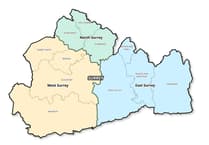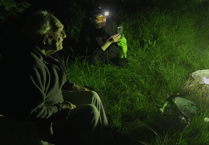CHANGING cartridges on her mum’s BIPAP machine and putting the mask on, helping with a nebuliser, injecting haemoglobin – similar to a blood transfusion – walking her mum to the bathroom, cutting up food, offering emotional support and countless hospital visits... they’re just some of the day-to-day tasks Amy Kemp-Jones carried out as a young carer for her mum.
Amy has spoken out and told her story to mark Young Carers Awareness Day today.
Misdiagnosis
Amy’s mum, Ceri Jones, was originally diagnosed as a Brittle asthmatic with severe allergies, type 2 respiratory and osteoporosis.
But it later emerged Ceri had been misdiagnosed and had been given the “wrong treatment” since she was around 16 years old, according to Amy. She was found to have a primary immune deficiency called specific polysaccharide antibody deficiency (SPAD).
“SPAD is very rare so it was really hard for them to treat it,” says Amy.
When Ceri was diagnosed, she was one of only six in the country.
“She has lots of other things wrong now because of all the treatments for years,” said Amy.
This includes being diabetic and on insulin, having asthma, bronchiectasis, vocal chord dysfunction, allergies to nuts, egg, wheat and several antibiotics, osteoporosis with non-healing fractures, steroid muscle myopathy, chronic pain from fractures, spinal stenosis, secondary adrenal insufficiency (similar to Addison’s), high blood pressure, cataracts, anaemia, non-alcoholic fatty liver disease, deep vein thrombosis – which led to three pulmonary embolisms – and diverticulosis.
She also has “port a cath for IV access at home which requires regular care”.
“It’s so heartbreaking,” says Amy.
“I was in the caring role so I was giving her all these meds – and at the end of the day they were the wrong meds.”
Life as a young carer
Amy began caring for her mum when she was just five years old.
“At first I didn’t know I was a carer – my mum was just my mum and going into hospitals and stuff was just normal. Giving injections was normal.
“So it wasn’t until I was about eight that I actually realised that was what a carer was.”
Amy realised hers wasn’t a normal life when she was awarded a certificate of recognition from Girlguiding London and South East Region.
Aged just seven, Amy was helping her mum bathe her twin sisters, who were two years old at the time, when Ceri collapsed unconscious on the floor.
After calling for an ambulance, she packed a bag for her mum to take to hospital and looked after the twins.
At school, Amy had a teacher who helped her when she went through “a really rough patch”.
“Luckily she took an interest in me – I think it’s so important young carers know they can talk to someone at school.
“One of my insecurities was I thought social services would take me away, or something like that – but they don’t do that at all.
“They just want to make sure you’re okay and that you’ve got enough support around you.”
When Amy was in Year 5 at school she couldn’t read or write, so would memorise books.
“I was scared that if anyone found out they would take me away – I thought they’d blame it on my mum being ill,” she said.
“But actually it was just because I was dyslexic, so hadn’t got the right help.
“That’s another common situation, for people to hide these struggles because they don’t want people to find out what’s going on at home.”
Amy told the Herald she was lucky as she had a “really good family network”.
“You have to open up as a young carer,” she says.
“When I was younger, like nine or ten, to make it work I had to be open with my mum and my family. Because we have that good support network around us, it kept me going – but not everyone has that.”
Despite being in a wheelchair, Ceri still runs her own business as a music teacher.
“After finding working full time didn’t work for her, mum set up her own business working part time,” said Amy.
“She teaches all types of children, but mostly at the moment she teaches the ones who don’t really have much, who are in areas of poverty.
“She teaches a lot of young carers. The fact they get music lessons is so good – it’s a good barrier or bubble for them.”
Amy uses poetry to express herself.
“I’d sit in the hospital waiting room and have all these thoughts in my head, and then I started to write them down on the backs of doctors’ notes and prescriptions and then napkins – literally anything I could find.
“Every time we went to hospital, the first thing I’d do, after I packed all my mum’s stuff, was to grab a notebook so I could write things down.”
Moving out
Amy lived with her mum Ceri, dad Neville Kemp and 14-year-old twin sisters Molly and Rebecca Kemp-Jones – who were named by Amy, as her mum was in intensive care when they were born – in the village River in Dover.
Now aged 19, Amy is studying acting at the University for the Creative Arts in Farnham, so has moved out of her family home.
“I found it extremely hard to move away from the family and still worry about what’s going to happen,” she says.
“There was a time when my mum went into hospital and I got a call – I was like ‘I’m four hours away by train, how can I get home?’
“It was just that fear – this sounds bad – but would she die before I got there? What if the hospital messes up?
“Don’t get me wrong, the NHS is great – the individuals in the NHS, the members of staff, are brilliant, and there’s a nurse called Fernando who is amazing – but the actual system is so broken you can’t leave people alone.”
Amy’s advice
Amy’s first piece of advice to other young carers is: “Don’t be afraid to talk to people – especially at school.
“Although it me a while to find the right person, I ended up relying on them the whole way through school – and I still talk to them now.
“The internet can be your friend –visit the Carers Trust or Carers Support websites.
“Talk to people, be open. Don’t be scared to tell people when you need help.
“You may have managed for so long but you never know when you’re going to be in a situation where you need a little bit more help.”





This article has no comments yet. Be the first to leave a comment.